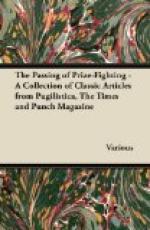Mr. G.M. Ay, there you have it. In truth, the question looks like a paragraph in a newspaper, upon which a Leading Article sits, dutifully arousing the fat worm of sarcastic humour under the ribs of cradled citizens, with an exposure of its excellent folly. For the word. That is it. The word is Archon, with extended hand summoning the collaboratorically ordained, misbegotten brood of shock-shilling pamphlets to his regal presence—
The Judge (testily). No doubt that would be so, but it brings us no nearer to a decision upon the question of humour in the particular passage of the book which contains the alleged libel.
Sir Charles Russell. Perhaps I can shorten matters, my Lord. Now, Mr. MEREDITH, will you be kind enough to explain the following passage from a book with which you may perhaps be acquainted. (Reads.) “This he can promise to his points. As for otherwhere than at the festive, Commerce invoked is a Goddess that will have the reek of those boards to fill her nostrils, and poet and alderman alike may be dedicate to the sublime, she leads them, after two sniffs of an idea concerning her, for the dive into the turtle-tureen. Heels up they go, poet first—a plummet he!” Is that humorous, or, if not, what is it?
Mr. G.M. Elephantine, I think; yet not elephantine altogether, since of them that crash amid jungle of atrophied semi-consciousness, strivingly set upon an overtopping mastery—
Sir Charles Russell (interrupting). Thank you. The passage is from One of our Conquerors. Here is another:—“Reverting to the father and mother, his idea of a positive injury, that was not without its congratulations, sank him down among his disordered deeper sentiments, which were a diver’s wreck, where an armoured livid subtermarine, a monstrous puff-ball of man, wandered seriously light in heaviness; trebling his hundredweights to keep him from dancing like a bladder-block of elastic lumber.” And while you are about it, pray inform the Court what you mean by “the vulgarest of our gobble-gobbets,” or by “a trebly cataphractic Invisible.”
Mr. G.M. Truly, the louder members of the grey public are fraternally instant to spurn at the whip of that which they do not immediately comprehend. But to me, plunged chokingly in translucent profundities of aquamarine splendour, not of a truth that in the heights above splendour resides not, chidingly offering a fat whiskerless cheek to the blows of circumstance, this was ever the problem of problems. How to write. How not to write. This way and that the raging fates tug the hapless reader, pillowed he upon the vast brown bosom of his maternal earth, or lurefully beckoning the dim shadow-shapes of dodecahedronic cataplasmatic centipede fatally conditioned to the everlasting pyramid of a star-pointing necessity. So—
The Judge (with determination). Mr. MEREDITH, the Court is sincerely obliged to you for your extremely valuable evidence. We are unwilling to detain you any longer. Besides, after what you have said, the point is as clear as daylight. Good morning, Mr. MEREDITH, good morning. You may become a trebly cataphractic Invisible.




